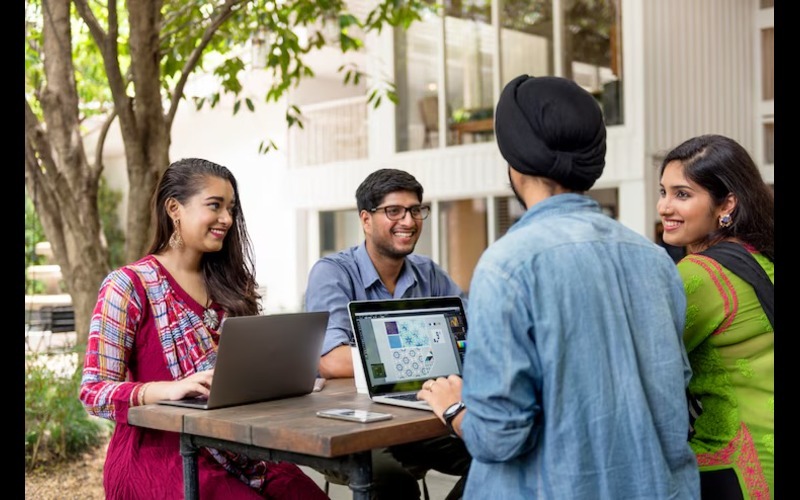Heritage And Tech Shine At Youth Skills Day Finale
Share

The World Youth Skills Day 2025 celebration concluded with a bang on Wednesday at the Indira Gandhi Pratishthan in Lucknow in a super-high-energy celebration of a strong combination of tradition and technology. Hosted by the Department of Information and Public Relations, Uttar Pradesh, the event gathered together government officials, industry, training organizations, and youth to commemorate skill development as the cornerstone of a self-dependent tomorrow. The event also demonstrated how Uttar Pradesh is making it convenient to merge its rich history with new-age technologies to empower its youth.
One of the major highlights of the closing ceremony was a panel discussion on “Balancing Traditional and Modern Skilling,” where top-notch experts debated how skills like handicrafts, weaving, and carpentry, which originated centuries ago, can be blended with new skills like Artificial Intelligence, automation, and digital designing. The experts stressed that skilling has gone beyond livelihood—it is a process of saving culture while embracing innovation. Uttar Pradesh’s new skilling strategy is being viewed as an example where the past and the future coalesce in the form of economic and social opportunity for youth.
During the employer conference that was also organized during the event, the CEOs and heads of HR of leading industry companies had face-to-face interaction with youth and discussed how skills training can be integrated with actual industry needs. These sessions were used as an open discussion forum in which the employers elaborated on the skills they require and how employment-focused training programs would be able to fill the gaps that exist. Joint Director Mayank Gangwar described the interaction as a positive step towards enhancing the bridge between training and employment, emphasizing the department’s continued focus on industry-integrated learning models.
Dr. Hariom, Principal Secretary of Department of Vocational Education, Skill Development & Entrepreneurship, pointed to the state government’s vision of creating a future-ready workforce. Referring to the leadership of Chief Minister Yogi Adityanath as an example, he stated that the government is committed to empowering the youth with a two-toolkit of conventional knowledge and future-generation abilities. Technologies like AI, data science, green energy, and automation are being included in the skilling ecosystem of the state. Dr. Hariom once again stressed that the objective is to make youth not job seekers but job givers through quality training, industry-academia partnership, and entrepreneurship through innovation.
Mission Director Pulkit Khare gave an integrated presentation of flagship schemes under Uttar Pradesh Skill Development Mission. He brought to light the functioning of the Deen Dayal Upadhyay Grameen Kaushalya Yojana (DDUGKY) and State Skill Development Fund (SSDF). The schemes are directed towards rural and urban skill gaps by making industries partners for curriculum development and practical training. Khare brought to notice that district-level industries are being groomed as training partners, thus the youth would be given job-oriented training and employment opportunities within reach. He also added that Memorandums of Understanding (MoUs) are being actively implemented with industries with a view to quicker placement of candidates with skills.
As part of an initiative to bring modernity in infrastructure for skill development, Khare stated that the ITIs in Uttar Pradesh are being technologized. New-generation sectors like Information Technology, Artificial Intelligence, and Green Energy have been incorporated into the syllabus now, along with conventional trades. Personality development and soft skills have also been highlighted with the aim of infusing global competitiveness in trainees.
The day also saw engaging multimedia presentations, such as #SkillHero reels on the success stories of trained youth from different districts who have made success out of their training. In the “Trainers Speak” session, mentors talked about new methods of teaching and how these are being experienced on ground. The “Kaushal Chaupal” youth discussion program consisted of an open forum discussion, where students spoke about their experiences, career ambitions, and learning history.
Another panel discussion, again, was conducted on “Skill Gap Analysis – Demand vs. Supply,” where government representative, academicians, and industry experts assessed the success of mission-oriented schemes. The panel asserted that constant interaction with the industry and periodic updation of the curriculum are necessary to bridge the skill gap affecting the majority of industries.
Along with intellectual debate, the event also included practical demonstrations and cultural expressions. Sensor-based inventions, intelligent farm implements, and green devices were demonstrated by ITI students. Workshops addressed themes of work such as career guidance, demonstrating how well-advised advice assists youth in putting their inclinations against practical livelihood choices. The contribution of national reports like the India Skills Report was also deliberated upon in supporting policy-makers and institutions to streamline strategies.
Competition was also held at the time of celebration in which different training centers presented their excellence by creating skills according to products. In the Food Stall category, Subhwanti Social Welfare Society won the first prize for their indigenous Litti-Chokha. The second prize was given to NEDS Skills and Services Pvt. Ltd for their innovative Farha and Sattu shakes, and third prize was given to Frontline-NCR Business Solutions.
In private trainer business product sales, Universal Ideal Seva Samiti dominated sales in doormats and jute bags, followed by First Line Global Services in women’s clothing and Cyber Academy for its Chikankari sarees and suits. In government institutions, the State Staff Training & Research Centre grabbed the first prize for apparel sales, while Government ITI Lucknow Division amazed everyone with automation simulators, clap switches, and environment-friendly products as the second prize winner. Third prize for presentation was bagged by U.P. Khadi and Village Industries Board.
It was ended on a note of cultural evening with folk dances, music, drama, and poetry from the rich cultural heritage of Uttar Pradesh. The children who arranged these performances echoed the theme of the event: “Skilled Uttar Pradesh, Self-Reliant Uttar Pradesh.” To celebrate skills also meant to reaffirm the commitment of the state to create a workforce that was deep in its roots and as far-reaching as its future would allow.
























